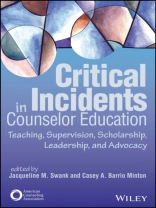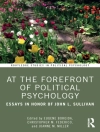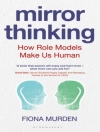In this textbook, prominent counselor educators provide guidance on key aspects of counselor education through case incidents in which an educator, student, supervisor, supervisee, researcher, or leader in the field is facing an ethical, moral, legal, or professional dilemma. Forty diverse case scenarios spanning four CACREP Standard domains for doctoral programs focus on real-world application of theories, concepts, and techniques. The incidents provide multiple perspectives on current issues faced in practice and promote learning opportunities for growth and development through critical thinking, discussion, and reflection. Each incident includes an evaluation of professional issues, a review of appliable ethical codes, a discussion of diversity and inclusion considerations, and an analysis of action steps and outcomes.
*Requests for digital versions from ACA can be found on www.wiley.com
*To purchase print copies, please visit the ACA website
*Reproduction requests for material from books published by ACA should be directed to [email protected]
Table of Content
Preface xiii
Acknowledgments xv
About the Editors xvii
About the Contributors xix
Part I: Teaching
Section 1: Student Engagement and Dispositions
Chapter 1 I Don’t Have a Clue: Responding to Unprepared or Unengaged Students 5
Chapter 2 I Did My Part: Responding to Inequitable Group Project Contributions 13
Chapter 3 It’s Not Their Work: A Case of Plagiarism 21
Chapter 4 Too Much Information: Maintaining Boundaries During Skills Practice 29
Chapter 5 I’m a Counselor . . . Well Almost: Boundary Extensions in Service Learning 37
Chapter 6 I’m Here, I’m Not Participating: Student Resistance to a Group Experience 45
Section 2: Dynamics Related to Diversity and Inclusion
Chapter 7 Whose Cultural Competence? Students’ Needs in Multicultural Courses 53
Chapter 8 A Cohort Divided: Navigating Tensions Related to Race and Ethnicity 61
Chapter 9 I Need a New Partner: Addressing Cultural Encapsulation and Racism 69
Chapter 10 Interacting With Me: Title IX and Faculty-Student Consensual Relationships 77
Section 3: Instructor Preparedness
Chapter 11 Embracing the Digital World: Instructor Preparedness for Online Delivery 85
Chapter 12 Does It Apply to Me? Instructor Competency to Teach Specialty Courses 93
Chapter 13 Something to Share: Promoting Unethical or Illegal Practice 99
Part II: Supervision
Section 1: Supervisee Dispositions and Behaviors
Chapter 14 This Is Cool, Does It Work? Using a Technique With Limited Training 111
Chapter 15 I Don’t Believe in That: Addressing Counselors’ Values Conflicts 119
Chapter 16 I’m an Emotional Person: Determining Counselor Impairment 127
Chapter 17 Don’t Watch Me: Not Bringing Session Recordings to Supervision 135
Section 2: Issues With Site Supervisors
Chapter 18 I’m Getting Different Messages: Incongruence Between Supervisors 143
Chapter 19 The Other Side: A Supervisor Presenting Differently to Students 151
Chapter 20 To Tell or Not to Tell: Site Supervisor Impairment 159
Section 3: Doctoral Student Supervisors
Chapter 21 Biased: A Doctoral Student Supervisor’s Struggle With a Supervisee’s Lack of Awareness 167
Chapter 22 I’m Attracted to My Supervisee: A Doctoral Student Supervisor’s Struggle 175
Part III: Research and Scholarship
Section 1: Collaboration and Authorship
Chapter 23 That’s My Idea: Taking Someone Else’s Work as Their Own 187
Chapter 24 Who to Include: A Case of Contested Authorship 195
Chapter 25 Is This How It’s Supposed to Be? Collaboration Gone Wrong 203
Section 2: Client Interest and Well-Being
Chapter 26 I Need Your Approval, but I Don’t Want to Do That: Getting IRB Approval 209
Chapter 27 Should He Be Included? I Know His Sister 215
Chapter 28 Do We Stop the Study? Best for the Client vs. Best for Research 223
Section 3: The Publication Process
Chapter 29 A Little Bit Here, a Little Bit There: The Least Publishable Unit 229
Chapter 30 It’s Already Published: Can I Still Submit My Manuscript? 237
Chapter 31 Do I Compromise to Get Published? Responding to Reviewers’ Feedback 243
Part IV: Leadership and Advocacy
Section 1: Professional Organization Leadership
Chapter 32 Is There a Conflict? Balancing Fiduciary Responsibility 255
Chapter 33 Who Are You Representing? Serving Two Professional Organizations 263
Chapter 34 True to Our Mission: Establishing an Identity as a Professional Organization 271
Chapter 35 It’s All About Mentorship: Managing Professional Journals 279
Section 2: Leadership and Advocacy in the Local Community
Chapter 36 What Should We Fund? Addressing Budget Issues on a Community Board 287
Chapter 37 My Hands Are Tied: Navigating University Prohibitions on Advocacy 297
Section 3: Diversity and Inclusion Within Counselor Education Programs
Chapter 38 Do We Practice What We Preach? Diversity and Inclusion Plans 305
Chapter 39 Maybe I Can Change This: Addressing Marginalization in a Program 313
Chapter 40 You Can’t Treat Me That Way! Microaggressions and Bullying 321
References 329
Index 363
About the author
Jacqueline M. Swank, Ph D, LMHC, LCSW, RPT-S, is an associate professor of counselor education at the University of Florida. She has extensive experience working with children and adolescents and their families in various counseling settings, including outpatient, day treatment, inpatient, and residential treatment facilities, and has worked clinically in both the United States and England. Her research interests focus on the holistic growth and development of children and adolescents, counselor competency, assessment, nature and play-based interventions, and international counseling.
Casey A. Barrio Minton, Ph D, NCC, is a professor of counselor education and the counselor education unit coordinator at The University of Tennessee, Knoxville. Her scholarly work focuses on crisis intervention, clinical mental health issues, and professionalization through teaching and leadership. She most enjoys teaching doctoral courses in professional orientation and teaching and master’s-level courses in multicultural counseling, diagnostic issues, and crisis intervention.












